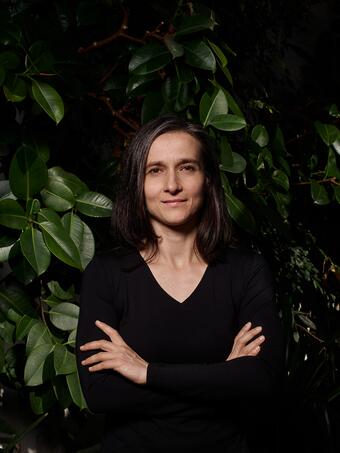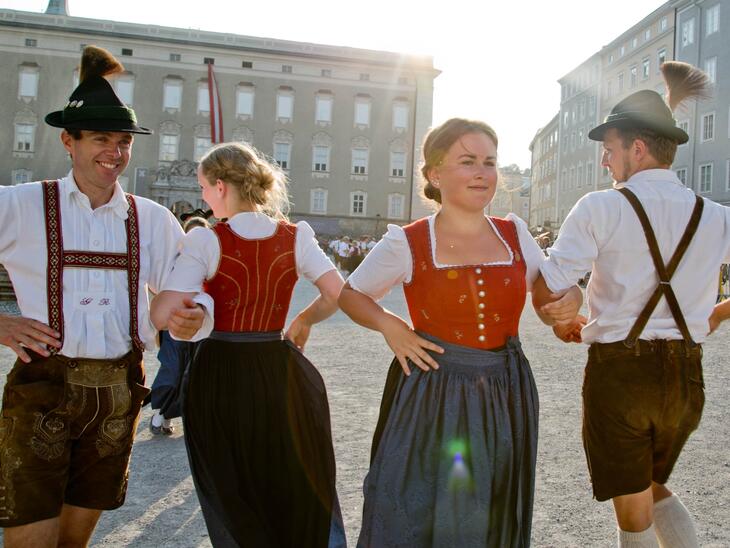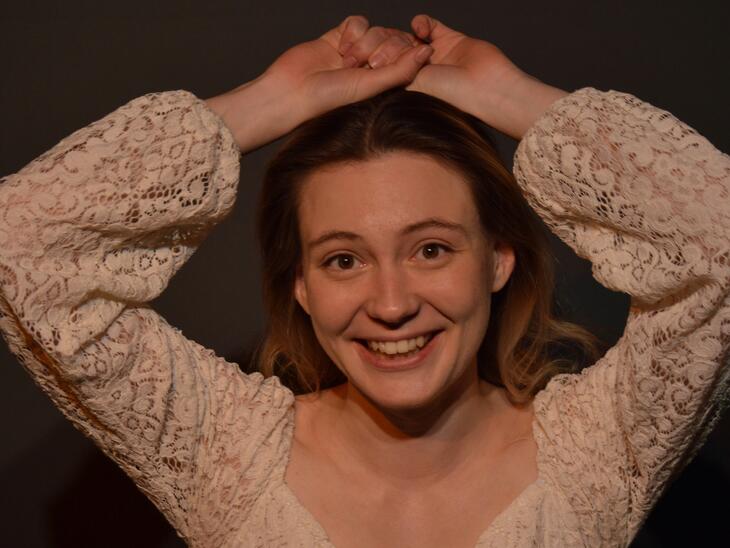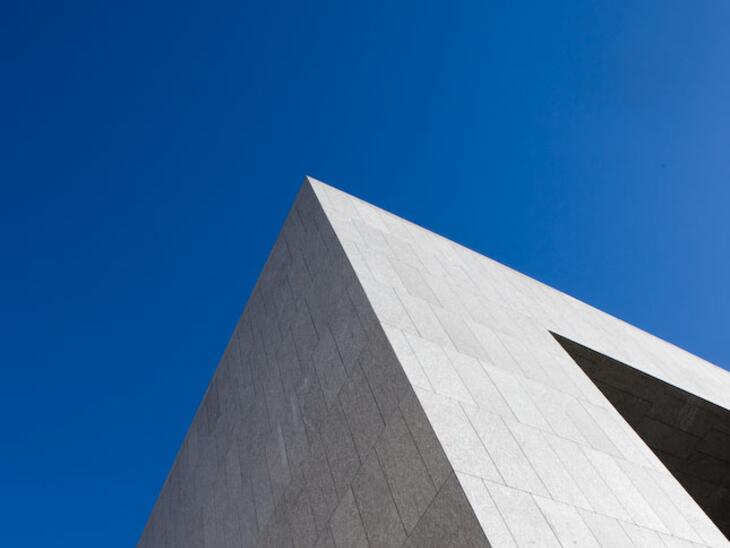Per Artistic Research through the Galaxy
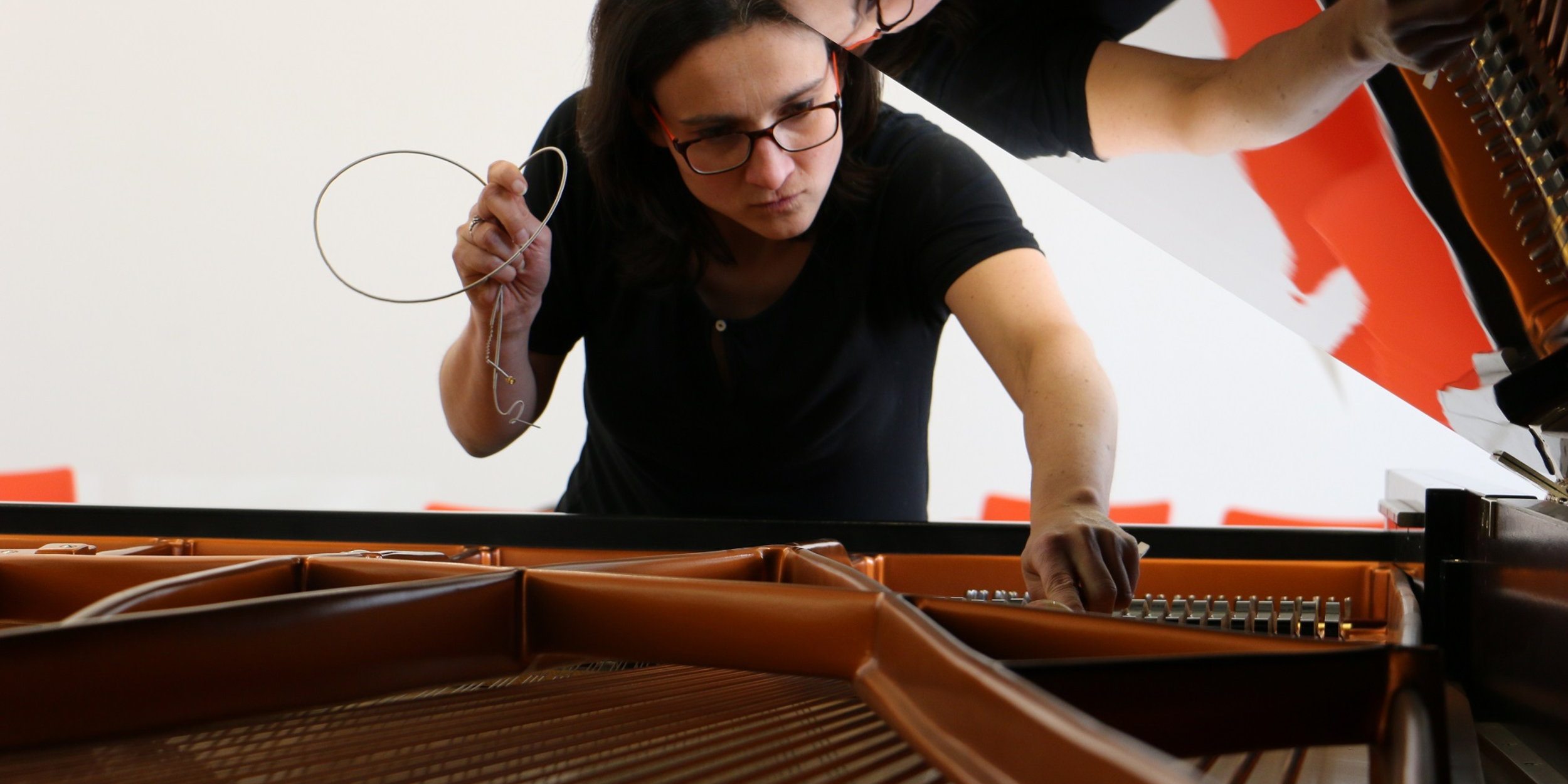
The Italian musician, graphic designer and video artist Lucia D'Errico took up one of the first two professorships for Artistic Research at the Mozarteum University in April. A conversation about the happiness that artistic research brings her.
Lucia D'Errico, you studied classical guitar at the Conservatorio Benedetto Marcello and English literature at the Università Ca' Foscari in Venice. When did you start to get interested in artistic research? Lucia D'Errico: In fact, my immersion in the world of artistic research was accidental. In 2014, while looking for a permanent position, I came across a call for applications at the Orpheus Institute in Geneva, which immediately excited me. Because it looked very much like the position and the institute, one of the leading centers for artistic research in Europe, could bring together and catalyze a wide range of interests that had no place in my life as a musician. Also because this life was strongly regulated by the market and by expectations that I personally found restrictive. Then, in Geneva, I quickly realized that Artistic Research was a field where I could redefine myself as an artist because there were different rules. This job changed my life and was like a kind of enlightenment. When you arrived at the Orpheus Institute, was it immediately clear to you where your journey was going? I was lucky because my dissertation was part of the "MusicExperiment21" project and I benefited from a strong community of researchers, but also from an enormous creative energy that the project exuded. It offered an overwhelming fireworks of new ideas and possibilities - and it felt natural. What definitely took a while was figuring out what Artistic Research actually is, as the field itself refuses to give a clear definition. That's irritating at first, and can also be frustrating. But what I liked right away is that Artistic Research is a verb, not a noun*. You have to do it and it takes time, you have to stick with it. And that's a good thing, too. Because that's exactly where the opportunity lies to lead artistic attention away from the end result. The power of Artistic Research lies in its focus on the process. So everyone who enters this world has both the chance and the responsibility to redefine it. I find that absolutely exciting and also revolutionary. Both for art and for science. In your dissertation "Powers of Divergence. An experimental approach to written music," you pose the question of whether one can abandon the faithful reproduction of a score without abandoning the heritage of Western notated art music. Can one? The answer to the question depends on what we mean by this heritage. If we start from the premise that it is a heritage in the sense of a closed reservoir of museum objects that must be preserved in their original state, then this notion closes off access and the works will forever remain what they are. But if we assume that these works are not something, but do something, and that they have the ability to affect us or communicate with other times because of their location in a particular historical period, then we can indeed do something with them and experiment with different possibilities. The book and the project wanted to show one of these possibilities. The most important thing, in my opinion, is a change of perspective - away from closure to the possibility of opening up. And most importantly, to invest in something that is relevant to today. As a classical musician yourself, have you suffered from the "museumization" of music? It must be mentioned at this point that for a long time I was really very precise in reading scores. That's probably exactly what led to my outburst, or at least it contributed a significant part to it. But yes, I also suffered from a dissatisfaction that came with a contradiction. Namely, the contradiction of the supposedly free performer stuck in a supposedly open score and its information. There exists this illusion of communication between the two sides, which is paradoxical and at some point no longer worked for me personally. Which of your artistic research projects was particularly enriching for you? One project that I enjoyed the most, besides my dissertation on divergent perfomances, was "Rasch X." It was based on Robert Schumann's "Kreisleriana" op. 16 (1938) and Roland Barthes' essay "Rasch." Via further acoustic and visual elements as well as numerous texts, we generated a network of aesthetic-epistemic cross-references within the framework of this artistic research project, which were intended to open up additional levels of perception for the audience: that of the music, that of the projected and read texts, that of the images and the voices. Beyond interpretation and hermeneutics, "Rasch X" thus explored an experimental performance practice that departs from conventional, repetitive performance and transforms familiar artistic objects into objects of thought via an infinite galaxy of layers, things and objects - including manuscripts, editions, recordings, but also philosophical texts. And thus opened up the piece. In the end, we did play the piano piece, but it was only one element of many. The reactions of the audience, which usually has nothing to do with artistic research, were amazing. What significance can the two professorships have for the Mozarteum University? Artistic Research definitely holds an undreamt-of development potential for artists that should at least be seen and recognized. Most artistic personalities are researchers anyway, as they rarely work without context - whether social, political or cultural. Most of the time, they write about their work. Even if they are just program texts, that is already a start. This is also a form of verbalization that goes hand in hand with reflection and is thus a kind of research. For the Mozarteum University, I would like to see research become more visible, not as something that only a few do, but as a great opportunity from which we as musicians, as artists, can benefit enormously. Powers of Divergence. An Experimental Approach to Music Performance, Leuven University Press 2018 Artistic Research: Charting a Field in Expansion, forthcoming from Rowman & Littlefield International (First published in Uni-Nachrichten / Salzburger Nachrichten on June 5, 2021)
